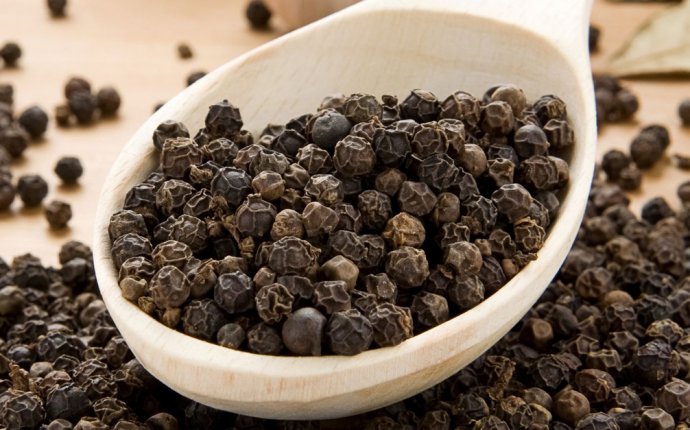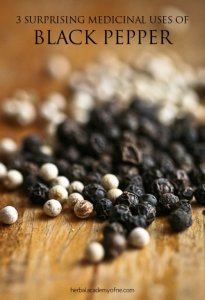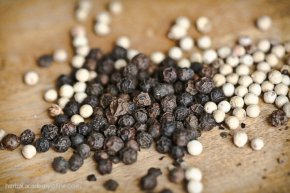
Black pepper in Ayurveda
 Choose whole peppercorns and store away from light ready to grind them. Look for peppercorns that are uniform and rich in color, with a strong aroma. Organically grown black pepper associated with a fair trade cooperative is highly preferable to conventional pepper. Black, green, and white peppercorns all come from Piper nigrum, and are unique in color and taste because of differences in processing and preparation.
Choose whole peppercorns and store away from light ready to grind them. Look for peppercorns that are uniform and rich in color, with a strong aroma. Organically grown black pepper associated with a fair trade cooperative is highly preferable to conventional pepper. Black, green, and white peppercorns all come from Piper nigrum, and are unique in color and taste because of differences in processing and preparation.
Black Pepper Aids Digestion
Like many aromatic kitchen herbs, black pepper is considered a carminative in Western herbalism, and in Ayurveda black pepper is known to enkindle agni, the digestive fire (Lad, 1984). These actions are likely due to the taste of black pepper on the tongue triggering the stomach to release hydrochloric acid, which is needed to digest protein, and pepper’s ability to stimulate digestive enzymes in the pancreas (Srinivasan, 2007).
 Black Pepper is an Antioxidant
Black Pepper is an Antioxidant
A constituent in black pepper, piperine, protects against oxidative damage by inhibiting free radicals and reactive oxygen species, as well as positively influencing antioxidant enzymes (Vasanthi, 2010).
Black Pepper Safety
Only culinary amounts of black pepper should be used by those who are pregnant and breastfeeding. Black pepper may inhibit drug metabolism so those taking certain pharmaceutical medications should speak with their physician prior to using black pepper. It is neither recommended nor necessary to take pepper in large amounts, as culinary use (1/2 teaspoon or less) goes a long way.
A constituent called safrole found in very small amounts in black pepper as well as basil, star anise, nutmeg, and ginger was given a bad rap after researchers injected high quantities of the chemical into rats, who subsequently developed liver cancer. However, such a study tells us nothing about the effect in humans eating small amounts of the whole peppercorn. In contrast, research data on humans and whole black pepper consumption indicates that black pepper has anti-carcinogenic actions (Liu, 2010). In any event, safrole content significantly decreases when peppercorns processed according to traditional preparation methods involving heat and drying.
Tasty Recipes Using Black Pepper
 REFERENCES
REFERENCES
Frawley, David, and Vasant Lad. (1986). Twin Lakes, WI: Lotus Press.
Lad, Vasant. (1984). Ayurveda. Twin Lakes, WI: Lotus Press.
Liu Y, Yadev VR, Aggarwal BB, Nair MG. (2010). Inhibitory effects of black pepper (Piper nigrum) extracts and compounds on human tumor cell proliferation, cyclooxygenase enzymes, lipid peroxidation and nuclear transcription factor-kappa-B. Nat Prod Commun. Aug;5(8):1253-7.
Singh A, Duggal S. (2009). Piperine-Review of Advances in Pharmacology. Int J Pharm Sci Nanotechnol; 2:615-20.
Srinivasan, K. (2007). Black pepper and its pungent principle-piperine: A review of diverse physiological effects. Crit Rev Food Sci Nutr, 47(8):735-748.
Vasanthi, H, Parameswari, RP (2010). Indian Spices for Healthy Heart. Curr Cardiol Rev. November; 6(4): 274–279.














